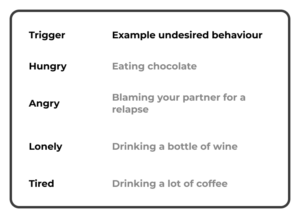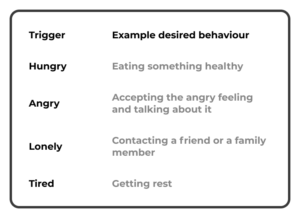What are feelings?
Feelings prepare your body for action and signal that you have a need. For example, you often experience anger because you have a need for justice. Your body sends out a signal as soon as you feel an emotion, such as accelerated breathing and a tingling or a knot in your stomach. Your body is ‘activated’, ensuring that you have the energy and are prepared to change your current situation. If you are in touch with your body, you will be quick to notice these particular sensations. If you don’t feel many emotions, it probably means you’re not paying enough attention to how your body is feeling. You will probably notice that you are regularly suffering from restlessness, or a feeling that you cannot properly identify. This indicates that your emotions are being suppressed. We suppress our emotions in many ways: one person will distract himself, another person will get ‘stuck’ in their head and start worrying.
Feelings during a current addiction
During an active addiction (daily or almost daily use), an addict does not want to feel many emotions. They prefer their emotions to be pushed away or distorted. Because this pattern of behaviour is repeated over a long period of time, an addict teaches himself that he cannot tolerate unpleasant emotions. By doing so, he/she remains addicted and, thus, the negative spiral is maintained.
Feelings during a recovery process
When you stop using an addictive substance or conducting addictive behaviour, the suppressed emotions are able to surface. This can feel bad or uncomfortable in the beginning. Restlessness is the word often used to describe this feeling. At the start of your recovery process, there can be a period during which you feel even worse. This is because you were used to going through life ‘numb’ for a long period of time. Thus, the emotions can feel very intense. During your recovery process, you will learn to look at your emotions from a new perspective and learn how to tolerate them. The longer they are suppressed or numbed, the worse you can feel in the long run. Step by step, you are going to learn to change the way you manage your emotions. You will learn new skills from your professional and put them into practice.
The principles of HALT can help you understand what your emotions are trying to tell you and what your underlying needs are. It is a mnemonic to help remind you of the potential risk of relapse.
HALT
HALT stands for Hungry, Angry, Lonely and Tired. These are risk factors that every addict has to deal with. If you feel hungry, angry, lonely or tired, the threshold for relapsing becomes lower. These feelings can be seen as triggers, which, over time, have become associated with your addiction. Triggers are the thoughts, emotions, circumstances and certain sensations that cause you to experience a craving.


Mapping out triggers
To learn what your triggers are, it is important to map out how and when you experience cravings. You can keep track of when you feel the HALT triggers. Keeping track of your HALT triggers can help you to be alert of the moments you experience them, so that you can avoid a craving.
One of the most important steps is to become aware that there is a strong tendency to ‘use’ when you feel bad or low. The next step is to take good care of yourself to avoid feeling hungry, anxious, lonely, or tired on a regular basis. Improving your daily structure can help you do this.
Remember to be patient with yourself. It takes time to re-learn how to listen to your body’s signals.
Finally, a number of motivational thoughts to conclude this assignment:
- You can learn to accept your emotions and leave them be.
- You are able to change your behaviour.
- You are not your thoughts. You can observe them from a distance and even change them.
Exercise
Write down what your desired behaviours are in regard to the HALT principles.

 Print
Print 
